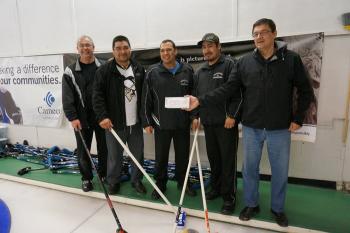Image Caption
Summary
By Sam Laskaris
Windspeaker Contributor
SASKATOON
Officials from a small village in Saskatchewan are once again gearing up to host a national curling championship.
Ile-a-la-Crosse, a Métis community, will host the National Aboriginal Curling Championship, which begins on March 30. The national bonspiel, which continues until April 2, will be staged at Saskatoon’s Granite Curling Club.
Ile-a-la-Crosse does have its own curling facility, the T-Line Curling Club. But it only has two sheets of ice.
That’s why this will mark the fifth straight year it has staged the national event in Saskatoon. The Granite Curling Club has enough ice to accommodate nine games at once.
The Canadian bonspiel has been running for more than three decades. But its future appeared bleak earlier this decade when the Métis Nation—Saskatchewan stopped organizing the event in 2012.
Following a one-year hiatus, Ile-a-la-Crosse officials opted to revive it in 2014.
“They were just going to let it go,” said Ile-a-la-Crosse Mayor Duane Favel. “Curling is alive and well in our community. We felt we could take it over.”
Favel said members of his community thought the national bonspiel was worth keeping, even if it meant they had to travel about 500 kilometres to Saskatoon to host it.
“It’s a good healthy way for the Indigenous community to gather,” he said.
Ile-a-la-Crosse, which has a population of about 1,700, ran its own winter league this year out of the T-Line Curling Club. And it also hosted a handful of tournaments at the facility as well.
As for this year’s nationals, organizers can accommodate a total of 48 teams. They are hoping to attract 32 men’s teams and 16 female squads.
Smith said it costs about $30,000 each year to run the tournament.
This year squads will be vying for a share of the $22,300 in cash prizes.
Members of the winning men’s club will share $4,000. The second-place finishers in the men’s division will take home $2,400 while those that place third and fourth will win $1,600 each.
And those teams that place fifth through eight will be rewarded with $1,000 each.
The winning club in the women’s category will take home $2,000 while the runners-up will win $1,500. Those placing third and fourth get $1,000 each while teams placing fifth through eight end up with $800 each.
Organizers are hoping registration fees will cover the majority of the prize money. The entry fee is $500 for each men’s team and $400 for those entering the women’s division.
Favel said tournament officials have also relied on sponsorships in recent years to cover their costs.
“We’re always around the break-even point or making just a little bit of money,” he said. “Any money we do make goes back into the tournament for the next year.”
Besides the prize money being offered, other expenses incurred by the organizers are the costs to put on a banquet for participants as well the costs of hiring some live entertainment.
As was the case in recent years, organizers will also be staging a youth curling clinic in conjunction with the tournament.
Former elite curler Stefanie Lawton, a Saskatoon native, will once again be the guest instructor.
“We usually get 15-20 kids,” Favel said.
The clinic usually lasts a couple of hours and Lawton, who participated in four Scotties Tournament of Hearts, the national women’s bonspiel, will teach the youngsters the nuances of curling.
“They won’t play a full game because a lot of them are beginners,” Favel said. “But she’ll show them things like sliding and they’ll get to throw some rocks.”
Lawton, nee Miller, had skipped a team to victory at the 2000 Canadian junior championships. She also led her rink to a silver medal at the world junior championships that year staged in Geising, Germany.
Favel is expecting the calibre of play at this year’s nationals to be good.
“It’s really competitive,” he said. “We have a lot of talent out there. Some of the people that have played in this tournament have played for professional rinks.”
This list includes Kevin Koe, who skipped the Canadian men’s entry at the recent PyeongChang Olympics to a fourth-place finish.
Koe was born in Yellowknife and his father is a member of the Gwich’In First Nation in the Northwest Territories.
Koe, who won the 2010 and 2016 world men’s titles, participated at the 2001 National Aboriginal Curling Championships. His teammates at the Canadian Aboriginal bonspiel included his father Fred and brother Jamie.

